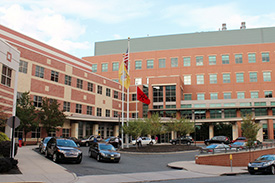May 1, 2015:
 A conversation with Robert S. DiPaola, MD, director of Rutgers Cancer Institute of New Jersey, which is a member of the Big Ten Cancer Research Consortium.
A conversation with Robert S. DiPaola, MD, director of Rutgers Cancer Institute of New Jersey, which is a member of the Big Ten Cancer Research Consortium.
Q: How do you think cancer research will change in the next 10 or 20 years?
Over the last 20 years, the development of powerful new technologies was instrumental in what we have come to understand about the complexity and heterogeneity of cancer, from the role of genetic mutations to the behavior of our immune systems.
The accomplishments of the last 20 years, more than any other period in cancer research, have set the stage for remarkably accelerated progress over the next 20 years, by teams that push the limits of what we imagined “multidisciplinary” could mean. Precision medicine teams that are working to create combination therapies to target the multiple genetic mutations in any individual cancer patient include physicists, mathematicians, and computer scientists. The challenges we face in understanding large-scale outcomes of such targeted therapies will require cooperation among research, clinical care, government, and insurance institutions. As our understanding of the biology of cancer and the human genome continues to evolve, our ability to create tailored treatments for patients and prevention strategies for well populations will improve dramatically.
In addition to the promise of these therapeutic approaches that target abnormalities in cancer cells, the last 20 years have brought us several breakthrough discoveries that set us up to harness the power of our immune systems to find and destroy cancer cells. Over the next 20 years we will develop immunotherapies that span an array of “attack” modes that we can tailor to the patient’s immune system characteristics and their specific cancer.
Cancer research today is on a rapid trajectory to discovery and cure thanks to many fields, including areas of genomic science and tumor immunology. In order to ensure that groundbreaking discoveries are made and progress continues, we must ensure that cancer research is well funded.
Q: What does translational science look like within your institution and in your collaboration with other Big Ten CRC member institutions?
 At Rutgers Cancer Institute of New Jersey we bring basic and clinical science together through a center-wide initiative designed as an Institutional Multidisciplinary Paradigm to Accelerate Collaboration and Translation (IMPACT). IMPACT has proved to be a highly effective tool to increase therapeutic investigator-initiated clinical trial activity. Under this initiative, scientific research programs guide development of pilot projects that foster clinical and basic research collaborations. Specific investigators are identified by center leadership to foster these basic science and translational collaborations and shepherd projects toward nationally recognized excellence. Clinical trial development is driven by strategic evaluation of the science in the basic science programs to identify clinical trial opportunities that are carried out in the clinical science arena. These efforts have resulted in an increase of approved peer-reviewed NCI studies. Our Precision Medicine program is fueled by a Molecular Tumor Board that brings together all clinical oncology disciplines, pathology, systems biology, genetics, and other basic science faculty to address individual patient treatment options based on molecular abnormalities identified through extensive genomic testing; reversing that translation, this group works with our new Precision Medicine Laboratory to build on discoveries in cancer genomics.
At Rutgers Cancer Institute of New Jersey we bring basic and clinical science together through a center-wide initiative designed as an Institutional Multidisciplinary Paradigm to Accelerate Collaboration and Translation (IMPACT). IMPACT has proved to be a highly effective tool to increase therapeutic investigator-initiated clinical trial activity. Under this initiative, scientific research programs guide development of pilot projects that foster clinical and basic research collaborations. Specific investigators are identified by center leadership to foster these basic science and translational collaborations and shepherd projects toward nationally recognized excellence. Clinical trial development is driven by strategic evaluation of the science in the basic science programs to identify clinical trial opportunities that are carried out in the clinical science arena. These efforts have resulted in an increase of approved peer-reviewed NCI studies. Our Precision Medicine program is fueled by a Molecular Tumor Board that brings together all clinical oncology disciplines, pathology, systems biology, genetics, and other basic science faculty to address individual patient treatment options based on molecular abnormalities identified through extensive genomic testing; reversing that translation, this group works with our new Precision Medicine Laboratory to build on discoveries in cancer genomics.
Q: In what ways is your institution involved in expanding access to clinical trials throughout the communities you serve?
Rutgers Cancer Institute of New Jersey has a network of hospitals that spans across our state. Our physicians, research nurses, and Office of Human Research Services work closely with the cancer programs at these hospitals to help open Cancer Institute of New Jersey clinical trials at their facilities, which would not be available to their patients without their affiliation with us. We also work with the community physicians to help them develop protocols to address issues they are seeing in their practices. In areas of the state where cancer disparities are a particular issue, we are placing disparities researchers and clinical programs targeted to the unique needs of the community.
Q: How is the Big Ten CRC unique from other research consortia in which you participate?
The Big Ten CRC’s mission focuses on investigator initiated clinical science and emphasizes the development of junior faculty members. The Big Ten CRC provides an outlet for these young investigators to pursue innovative ideas and collaborate with researchers across the country at other top cancer centers at Big Ten universities.
About the Big Ten Cancer Research Consortium: The Big Ten Cancer Research Consortium creates a unique team-research culture to drive science rapidly from ideas to treatment-changing paradigms. Within this innovative environment, today’s research leaders collaborate with and mentor the research leaders of tomorrow with the unified goal of improving the lives of all patients with cancer.
About the Big Ten Conference: The Big Ten Conference is an association of world-class universities whose member institutions share a common mission of research, graduate, professional and undergraduate teaching and public service. Founded in 1896, the Big Ten has sustained a comprehensive set of shared practices and policies that enforce the priority of academics in the lives of students competing in intercollegiate athletics and emphasize the values of integrity, fairness and competitiveness. The broad-based programs of the 14 Big Ten institutions will provide over $200 million in direct financial support to almost 9,500 students for more than 11,000 participation opportunities on 350 teams in 42 different sports. The Big Ten sponsors 28 official conference sports, 14 for men and 14 for women, including the addition of men’s ice hockey and men’s and women’s lacrosse since 2013. For more information, visit www.bigten.org.














Subscribe to the Big Ten CRC Newsletter X
X Facebook
Facebook YouTube
YouTube